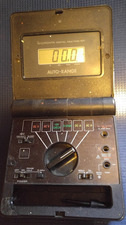midicollector wrote on 2024-04-10, 15:16:
If you’re going to have something forever, you probably don’t want to have it be crappy.
Well, I'm not sure there's anything that will last forever on this earth. 😁 😉
Jokes aside, I get what you mean and I also encourage people to always look out for deals on the better stuff.
Thing is, I also always try to be realistic with myself by asking: do I go straight to buying the expensive good stuff whenever I get into new hobbies or get ideas about trying new stuff, or do I wait a little to buy them only after I have a good idea that this is something I will be doing for a while. And I feel the same very much applies to electronics and computers as a hobby too - if it's something one will do for a while or longer, by all means get something better. And if not, then just go with the "good enough". I've had a lot of friends who started to dabble into electronics after they saw me do it and got inspired. For many of them though, it was a short-lived hobby. So probably a good thing they didn't "waste" money on good equipment that they have no use for after a bit.
BitWrangler wrote on 2024-04-11, 16:18:
If on a tight budget, I'd say get a used, maybe even up to 30 years old, name brand meter with just basic Voltage and Amps for poking at the dangerous stuff with (check condition of leads) and a cheapie new one with all the bells and whistles, transistor tester, autoranging ohms, capacitance, and then don't use it on anything higher than about 30V DC.
Nothing wrong with using a newer "noname" meter on high voltage high current stuff, so long as it's of decent enough quality.
Again, there seems to be a pretty steep improvement (usually) in meter quality after you pass on all those $5-10 manual-ranging cheapies. The likes of the auto-ranging Vici meters I pointed to above are of decent enough quality and can be trusted fine even for high(er) voltage circuits. The only difference between those and the Fluke's is that the Flukes are just more durable with long-term use (and occasional unintentional abuse) and that they are harder to destroy should you do something silly, like poke at high-voltage circuit while on resistance test. The cheapies are the ones to beware of, because they are straight-up safety hazards if that happens. The more decent meter will just either blow a fuse or gracefully die without any danger to the user. Meanwhile, the Flukes will almost certainly survive, because they are just better built.
So all in all, old Chinese proverb still applies: you always get what you pay for... if you are lucky
